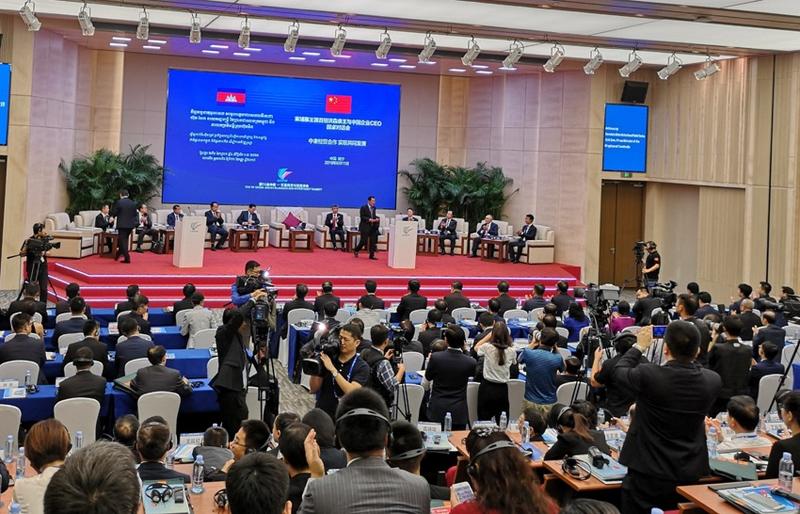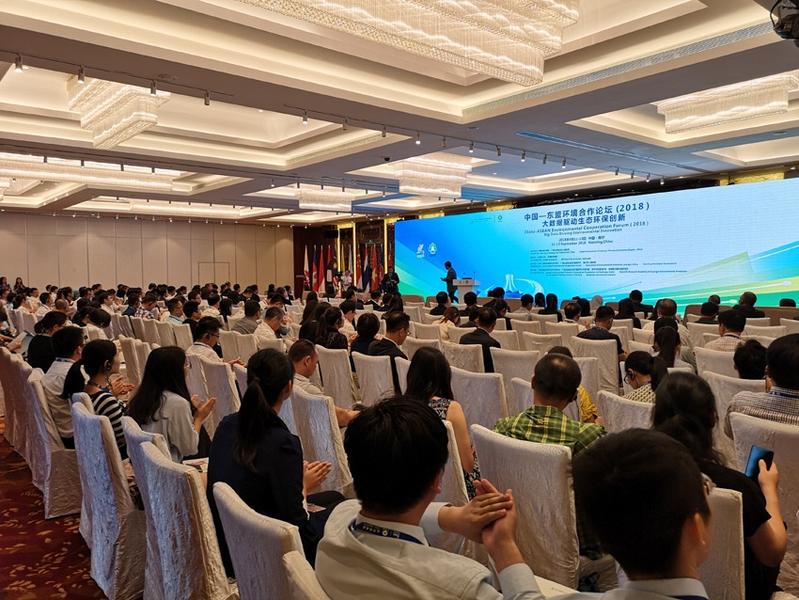Hun Sen, Chinese CEOs discuss investment in Nanning forum

Cambodia Prime Minister Samdech Hun Sen discusses investment details with Chinese business leaders in a morning session of the China-ASEAN Expo in China's Nanning, Sept 11, 2018. [Photo by WEN ZONGDUO/CHINA DAILY]
NANNING – Cambodia Prime Minister Samdech Hun Sen told Chinese CEOs Tuesday that his administration will try to improve investment environment and protect the interests of investors so that the potential of development in Cambodia could be further tapped.
Hun Sen made the assurance when he sat with bosses of Chinese enterprises and answered their questions on trade and investment in details at a roundtable discussion.
"We would be responsible for investors so that they will be at ease," he said through an interpreter at a session of the China-ASEAN Expo.
Hun Sen said he looks forward to receiving solid benefits from cooperation with China.
Six presidents and CEOs of large investors in Cambodia including Huawei Technologies, China Huadian and China Development Bank raised questions at the roundtable dialogue between the Cambodia PM and CEOs from China.
"It just doesn't work if there are vehicles but no road, and your companies are building roads for us," said the PM, who has been at the helm of the government for 33 years.
All the Chinese companies have been engaged in building infrastructure and other businesses under the Belt and Road Initiative proposed by Chinese President Xi Jinping in 2013.
Hun Sen recounted that Chinese investment had reached US$2.8 billion in the first seven months of the year, compared to US$900 million in 2016.
He said his administration is working to ensure political and stability which is favored by investors from all over the world. He listed agriculture, infrastructure, industries, tourism, finance and construction as top fields for development.
Cambodia works to ensure security for business development and "honor our agreements and pledges, which is a principle of ours," he said.
Hun Sen said Cambodia is expected to lower electricity prices in the future, to make people's lives better and bring benefits to enterprises thanks to investors like those from China.
Talking on debts, he said that they are borrowing loans within payment capabilities. "Our borrowings are generally via favorable loans and sovereign loans," he said. The loans are needed to promote construction of priority areas of the national economy, he added.
Hun Sen said Cambodia now needs to promote information technologies, which also raises efficiency and changes the way of governance. "I wish all of our people to be able to use internet," he said.
"I myself am using internet to fight corruption."
Internet technologies also help issuing wages to employees more efficiently, which helps prevent corruption, he said. "My cellphone can make me understand tax situation in real time," he said.
The progress in domestic connectivity in roads and telecommunications has picked up and paved way for speedy economic development, according to the Cambodia PM. Cambodia's GDP growth had averaged 7.6 percent between 1994 and 2015. This year's GDP growth is expected to exceed last year's 7 percent despite floods and other difficulties.
China has been the largest investor nation in Cambodia, as well as the largest trade partner, noted Chen Zhou, chairman of the Organizing Committee of CABIS and CCPIT.
Chen Feifu, president of China Datang Corp, said at the forum that his company is expecting more engagement in infrastructure in Cambodia.
Hodo Group chairman, Xu Zheng, said they have noticed the favorable environment for investment in Cambodia.
Wu Weitao, president of Southeast Asian headquarter of Huawei Technologies, said Cambodia has experienced high growth in digital economies largely thanks to its young population and government attention.

This photo shows a section of the participants during the China-ASEAN Environmental Cooperation Forum 2018, Sept 11, 2018. [Photo by WEN ZONGDUO/CHINA DAILY]
ENVIRONMENTAL PLATFORM FOR MUTUAL SHARING
The China-ASEAN for Environmental Information Sharing Platform was launched during the China-ASEAN Environmental Cooperation Forum 2018.
Addressing the event, Zhao Yingmin, vice minister of Ecology and Environment, said China made key arrangements in guidance, top-level design, legal guarantee and systemic reform over the past year.
Zhao said China is also making use of big data information to drive environmental moves and upgrade the country's green development.
Alexandre Caldas, chief of country outreach, technology and innovation branch of UN Environment, said the UN agency is tapping potential of big data for the benefit of world endeavors against pollution and plastic wastes, among other issues.
Zhang Jieqing, deputy director of the China-ASEAN Environmental Protection Cooperation Center, said the platform will help practical cooperation of the industries in line with initiatives raised by regional leaders and governments.
Among others who addressed the forum are: Aladdin D Rillo, deputy secretary-general for ASEAN Economic Community; Bounkham Vorachit, vice minister of Natural Resources and Environment of the Laos; Albert Chua, permanent secretary of Singapore's Ministry of the Environment and Water Resources; Heng Nareth, director general of environmental protection in Cambodian Ministry of Environment; and Tea Tyhas, vice governor of Cambodia's Siem Reap province.
